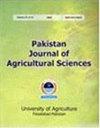基于ITRAQ的马铃薯对青枯菌反应的蛋白质组学分析
IF 0.6
4区 农林科学
Q3 AGRICULTURE, MULTIDISCIPLINARY
引用次数: 0
摘要
青枯病是马铃薯(Solanum tuberosum L.)的一种严重病害,由土壤传播的病原菌Ralstonia solanacearum引起。检测马铃薯植物蛋白丰度的变化是揭示植物病原体分子相互作用的关键一步。本研究以抗病品种“中薯3号”为研究对象,利用等压标记技术对马铃薯幼苗进行相对定量和绝对定量蛋白质组学分析,每12 h接种番茄红霉(R. solanacearum),共接种72 h。我们的研究结果表明,发病相关蛋白、应激相关蛋白、非特异性脂质转移蛋白、小热休克蛋白和渗透蛋白样蛋白在不同时间点对病原体感染的响应上调。这些蛋白质在生物胁迫下的积累表明,这些蛋白质在病原体抗性中起重要作用。我们的研究结果将为确定这些蛋白在提高植物对病原体的抗性和培育细菌抗枯萎植物中的作用提供重要的基础。本文章由计算机程序翻译,如有差异,请以英文原文为准。
ITRAQ-Based Proteomic Analysis of The Response to Ralstonia solanacearum in Potato
Bacterial wilt is a serious disease of potato (Solanum tuberosum L.) caused by the soil-borne pathogenic bacterium Ralstonia solanacearum. Detecting changes in protein abundance in potato plants in response to R. solanacearum is a pivotal step in uncovering the molecular interactions of plant pathogens. In this study, using the disease-resistant cultivar ‘Zhongshu 3’, we analyzed protein expression in potato seedlings inoculated with R. solanacearum every 12 h for a total of 72 h using isobaric tags for relative and absolute quantitation-based proteomics. Our results indicate that pathogenesis-related proteins, stressrelated proteins, non-specific lipid transfer proteins, small heat shock proteins, and osmotin-like proteins were up-regulated in response to pathogen infection at different time points. The accumulation of these proteins in response to biotic stress suggests that these proteins play an important role in pathogen resistance. Our findings will provide an important basis for characterizing the role of these proteins in increasing plant resistance to pathogens and in breeding bacterial wilt-resistant plants.
求助全文
通过发布文献求助,成功后即可免费获取论文全文。
去求助
来源期刊

Pakistan Journal of Agricultural Sciences
AGRICULTURE, MULTIDISCIPLINARY-
CiteScore
1.80
自引率
25.00%
发文量
18
审稿时长
6-12 weeks
期刊介绍:
Pakistan Journal of Agricultural Sciences is published in English four times a year. The journal publishes original articles on all aspects of agriculture and allied fields.
 求助内容:
求助内容: 应助结果提醒方式:
应助结果提醒方式:


